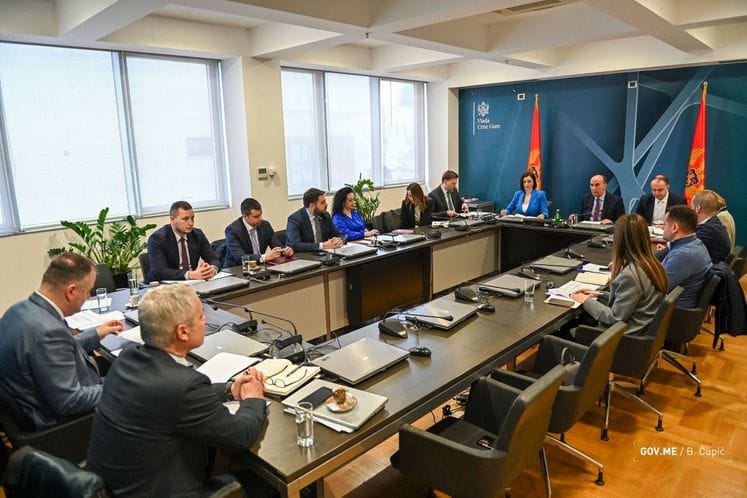- Government of Montenegro
First meeting of the Commission for resolving the ...
First meeting of the Commission for resolving the status of the "Dr. Simo Milošević" Institute - from agony to resolution

The first session of the Commission for resolving the status of the Institute for physical medicine, rehabilitation, and rheumatology "Dr. Simo Milošević" took place on 13 February, at the premises of the Government of Montenegro, following the Government's decision in early February of this year to establish the Commission. The Commission is composed of: Srđan Pavićević – Deputy Prime Minister for Labour, Education, Health, and Social Affairs (appointed by the Government as the Commission's President), and other members include ministers: Vojisav Šimun – Minister of Health, Nik Gjeloshaj – Deputy Prime Minister for Economic Policy and Minister of Economic Development, Janko Odović – Minister of Spatial Planning, Urbanism, and State Property, Novica Vuković – Minister of Finance, Vladimir Martinović – Minister of Tourism, Ecology, Sustainable Development, and Northern Region Development, as well as Nikolina Otašević – Commission Secretary, an official at the Ministry of Health. All members attended the session except for Minister Vuković, whose absence was substituted by the head of the office, Jovana Bojić.
In addition to the Commission members, the meeting was attended by Zoran Kovačević – Director of the Institute, Predrag Dragojlović, Chairman of the Institute's Board of Directors, Stevan Katić, President of the Municipality of Herceg Novi, as well as representatives of the Agency for Protection of Competition: Dragan Damjanović, President of the Agency Council, and Nebojša Jovović, Director of the Agency.
As a reminder, during the first visit to the "Dr. Simo Milošević" Institute in Igalo (December 2023), Deputy Prime Minister Srđan Pavićević and Minister of Health Vojislav Šimun, after reviewing the current situation, were clear that the Government would promptly address the challenges that have culminated after decades of neglect.
The first meeting of the Commission in its expanded composition involved a discussion of the consolidated management report on the Institute's operations over the past 5 years, with a particular focus on financial performance indicators, debt structure, available resources, risk analysis jeopardizing the Institute's survival, and analysis of opportunities ensuring its sustainability.
It was noted that the Commission faces a serious challenge, considering that the state, as the majority owner, is neither legally nor financially able to act as a creditor to assume all debts, despite the fact that it was precisely the state's years of negligent and irresponsible behavior that pushed the Institute to the brink of bankruptcy, from which it is now only days or months away.
The Commission initiated a discussion on a series of potential modalities for resolving the Institute's status – from the classic model of state aid allocation, changes in ownership structure, recapitalization, increasing prices for services for domestic users and aligning them with market prices for foreign users, asset sales, and opening new markets, with the conclusion that none of these models alone solves the acute problem the Institute currently faces.
Given all legal limitations regarding the allocation of state aid, particular attention was paid to the debt owed to the largest creditor – the Serbian Jugobanka, and the additional complication of the situation following the final decisions on the claims of the employees, which push the Institute's total debts to over 20 million euros.
The Commission's conclusion is that the complexity of this situation must be addressed in two directions, namely, Institute rescue (which is on the verge of bankruptcy) requires short-term measures, delaying or eliminating the worst-case scenario, as well as strategic measures - "rescue and restructuring" based on the model proposed by the Agency for Protection of Competition, which returns the Institute to a position that ensures its long-term profitability and competitiveness in both domestic and international markets.
If the current illiquidity is overcome and the worst-case scenario is avoided, there are real chances for the state, alongside existing management, to take the lead in developing a sustainable and successful business strategy and to capitalize on all of the Institute's resources as a unique and internationally recognized institution in the field of medical tourism.
By urgent procedure, the Commission tasked all relevant ministries whose representatives are members of this commission to form an operational team within the next seven days to offer the most efficient solution to unblock the Institute's account and enable the continuity of services to existing, i.e., domestic users, as well as potential foreign users who are currently inquiring and expecting offers from the Institute.
After that, one of the strategic models for long-term, sustainable, and profitable operation would be considered.
